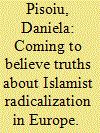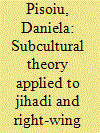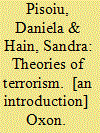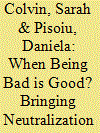| Srl | Item |
| 1 |
ID:
120329


|
|
|
|
|
| Publication |
2013.
|
| Summary/Abstract |
This article addresses four assumptions behind many of the current theoretical and policy approaches to individual processes of Islamist radicalization in Europe: the association with terrorism and extremism; determinism; the extraordinary nature of radicals; and the reification of the grievance and collective identity discourse. It argues for an intentional and developmental, rather than structural and socio-economic feature-focused, approach to the explanation of the radicalization process, with the consideration of framing and socio-psychological mechanisms having an impact on individual decision-making processes, and for an overall, broader conceptual understanding of radicalism.
|
|
|
|
|
|
|
|
|
|
|
|
|
|
|
|
| 2 |
ID:
138773


|
|
|
|
|
| Summary/Abstract |
This article assesses the applicability of subcultural theories to individual cases of jihadi and Right-wing radicalization in Germany, with a focus on the individual initial situation and motivation for involvement. Within an overall qualitative research design, the article tests deviance/strain and Centre for Contemporary Cultural Studies (CCCS) subcultural theories against four jihadi and three Right-wing extremist cases. The findings show little support for the strain-based status frustration hypothesis, but confirm the illegitimate opportunity structure thesis; modified versions of the CCCS’ resistance, bricolage, and homology concepts; as well as some of the postmodern approaches to agency and cultural cross-fertilization. The jihadi and Right-wing radicals examined here are assertive and purposive agents, strategically using the rich cultural arsenal available in the mainstream and/or other subcultures, while at the same time being themselves influenced by contemporary mainstream preferences of style. The article discusses the implications of these findings for radicalization research and specific subcultural approaches. It argues for a greater focus on both individual agency and the (sub-)cultural context for an improved understanding of individual involvement in political violence.
|
|
|
|
|
|
|
|
|
|
|
|
|
|
|
|
| 3 |
ID:
160192


|
|
|
|
|
| Publication |
Oxon, Routledge, 2018.
|
| Description |
xviii, 200p.: tables, boxespbk
|
| Standard Number |
9780415826082
|
|
|
|
|
|
|
|
|
|
|
|
Copies: C:1/I:0,R:0,Q:0
Circulation
| Accession# | Call# | Current Location | Status | Policy | Location |
| 059459 | 363.32501/PIS 059459 | Main | On Shelf | General | |
|
|
|
|
| 4 |
ID:
172060


|
|
|
|
|
| Summary/Abstract |
Bringing together terrorism studies, subcultural theory, and narrative criminology, we here test the thesis that neutralization theory might be (further) developed to provide a framework for understanding stories of ideologically informed subcultural violence. Beginning with Gresham Sykes's and David Matza's original five neutralizations, we illustrate how actors engage them in three modes: the encultured, the subcultural, and (tentatively) the postnarrative mode. We test the first two modes in particular against narratives and narrative fragments from interviews with men convicted of right-wing violence in Germany. Our findings provide a preliminary illustration of what neutralization theory might bring to research into political violence.
|
|
|
|
|
|
|
|
|
|
|
|
|
|
|
|